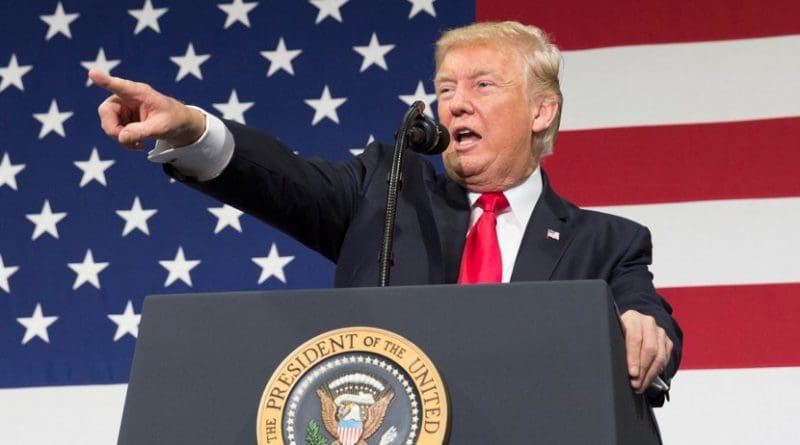Why Trump’s Union Is In A Bit Of A State – OpEd
By Arab News
By Andrew Hammond*
Donald Trump delivers his second state-of-the-union speech on Tuesday amid growing focus on his foreign policy. The address comes at a time when the president’s dramatic new “America first” aspirations appear confused and threadbare.
The latest sign of disarray came last week when, extraordinarily, key intelligence officials including CIA Director Dan Coats appeared at odds with Trump on issues such as North Korea, Iran and Daesh. This earned the presidential rebuke that “intelligence should go back to school” and the assertion that his own officials were wrong.
Trump was elected on a platform that could have reshaped US foreign and trade policy more radically than at any point since the beginning of the Cold War, when Harry Truman built a consensus around US global leadership.
But what was billed as a neo-isolationist doctrine has proved much less coherent in practice. To be sure, Trump has made some moves away from the post-war orthodoxy pursued by both Democratic and Republican presidents. He has scrapped involvement in the Trans-Pacific Partnership trade deal with allies in Asia-Pacific and the Americas, and withdrawn from the Paris climate change deal agreed by over 170 nations. These were Obama-era signature policies, and Trump has also partially rolled back other key Obama measures, including Cuba liberalization.
But dismantling policies is one thing. Building something new is another.
The administration has failed to forge any clear Trump doctrine, centered on his “America first” vision. Instead, there has been a steady stream of policy incoherence and U-turns on issues such as whether NATO is, in his words, “obsolete” or “not obsolete.”
Another example was Trump’s announcement that US troops in Syria were “all coming back and they are coming back now.” This proclamation, which appears not to have been shared with allies and contributed to the resignation of Defense Secretary Jim Mattis, has since been slowed down, if not rowed back, by National Security Adviser John Bolton.
These sleights of hand and flip-flops reflect not just the ad-hoc nature of the president’s style, but also divisions within his team on key foreign policy issues. While Trump appears to be much more aligned with current Secretary of State Mike Pompeo than predecessor Rex Tillerson, significant divisions remain.
Take Russia, where Trump’s instincts to redefine relations in a significantly warmer direction have not just alarmed some in his administration, but have also been set back by tightened US sanctions legislation in Congress; this alongside the significant pressure that the White House is under from investigations into alleged collusion with Moscow during the 2016 presidential election campaign.
The one unquestioned accomplishment of Trump’s foreign policy has been to provoke significant global backlash as underlined from polls by organisations such as Pew and Gallup. The latter found last year that the image of US leadership in the last year is significantly weaker worldwide, across 134 countries, with median approval at a new low of 30 percent.
The findings are supported by Pew polls in 2017 which found that about three quarters of the thousands surveyed internationally had little or no confidence in Trump’s global leadership and policies. In October 2018, Pew found favorable views of the US remain at historic lows.
To be sure, Trump does enjoy significant popularity in a small number of countries, including Israel, but his policy ideas and occasionally wild rhetoric threaten a sustained, deep spike in anti-US sentiment. At a time when Washington is facing a series of complex foreign policy challenges, the Trump team would benefit from more engaged, strong, and supportive allies.
It is in this context that Trump’s speech on Tuesday and first two years of foreign policy will be judged by many internationally, with much skepticism and nervousness about what his presidency means. While the president has had a tough 2017 and 2018 in terms of international opinion, it will only deteriorate in 2019 if he continues on the current course.
Moreover, two years into office, Trump’s political window of opportunity to put an enduring stamp on US foreign policy is narrowing. His ad-hoc style of governing, which regularly exposes lack of experience and knowledge of international issues, risks even greater confusion and incoherence.
Worse still could be potentially serious blunders, especially at a time of crisis. Since Trump is unlikely to change, and may even become more entrenched in his habits, it is to be hoped that no first-order foreign policy crises, including armed conflict involving the US, for which he appears so ill prepared, appear on his watch.
- Andrew Hammond is an Associate at LSE IDEAS at the London School of Economics

